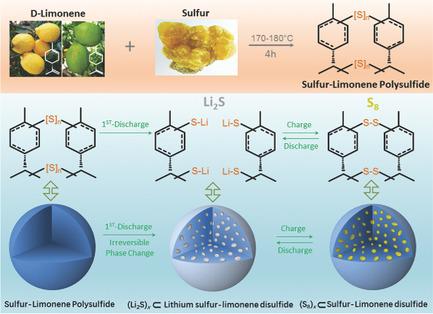当前位置:
X-MOL 学术
›
Adv. Mater.
›
论文详情
Our official English website, www.x-mol.net, welcomes your
feedback! (Note: you will need to create a separate account there.)
A Sulfur–Limonene‐Based Electrode for Lithium–Sulfur Batteries: High‐Performance by Self‐Protection
Advanced Materials ( IF 27.4 ) Pub Date : 2018-02-14 , DOI: 10.1002/adma.201706643 Feixiang Wu 1 , Shuangqiang Chen 1 , Vesna Srot 1 , Yuanye Huang 1 , Shyam Kanta Sinha 1 , Peter A. Aken 1 , Joachim Maier 1 , Yan Yu 1, 2
Advanced Materials ( IF 27.4 ) Pub Date : 2018-02-14 , DOI: 10.1002/adma.201706643 Feixiang Wu 1 , Shuangqiang Chen 1 , Vesna Srot 1 , Yuanye Huang 1 , Shyam Kanta Sinha 1 , Peter A. Aken 1 , Joachim Maier 1 , Yan Yu 1, 2
Affiliation

|
The lithium–sulfur battery is considered as one of the most promising energy storage systems and has received enormous attentions due to its high energy density and low cost. However, polysulfide dissolution and the resulting shuttle effects hinder its practical application unless very costly solutions are considered. Herein, a sulfur‐rich polymer termed sulfur–limonene polysulfide is proposed as powerful electroactive material that uniquely combines decisive advantages and leads out of this dilemma. It is amenable to a large‐scale synthesis by the abundant, inexpensive, and environmentally benign raw materials sulfur and limonene (from orange and lemon peels). Moreover, owing to self‐protection and confinement of lithium sulfide and sulfur, detrimental dissolution and shuttle effects are successfully avoided. The sulfur–limonene‐based electrodes (without elaborate synthesis or surface modification) exhibit excellent electrochemical performances characterized by high discharge capacities (≈1000 mA h g−1 at C/2) and remarkable cycle stability (average fading rate as low as 0.008% per cycle during 300 cycles).
中文翻译:

锂硫电池的基于硫Li烯的电极:通过自我保护实现高性能
锂硫电池被认为是最有前途的储能系统之一,并且由于其高能量密度和低成本而受到了广泛的关注。但是,除非考虑到非常昂贵的解决方案,否则多硫化物的溶解以及由此产生的穿梭效应会阻碍其实际应用。在此,提出了一种称为硫磺-柠檬烯多硫化物的富硫聚合物,它是一种强大的电活性材料,具有独特的决定性优势,可以解决这一难题。它可以通过大量,廉价且对环境无害的原料硫和柠檬烯(来自橙皮和柠檬皮)进行大规模合成。此外,由于硫化锂和硫的自我保护和限制,成功避免了有害的溶解和穿梭效应。在C / 2时为-1)和出色的循环稳定性(在300个循环中,平均衰落率低至每个循环0.008%)。
更新日期:2018-02-14
中文翻译:

锂硫电池的基于硫Li烯的电极:通过自我保护实现高性能
锂硫电池被认为是最有前途的储能系统之一,并且由于其高能量密度和低成本而受到了广泛的关注。但是,除非考虑到非常昂贵的解决方案,否则多硫化物的溶解以及由此产生的穿梭效应会阻碍其实际应用。在此,提出了一种称为硫磺-柠檬烯多硫化物的富硫聚合物,它是一种强大的电活性材料,具有独特的决定性优势,可以解决这一难题。它可以通过大量,廉价且对环境无害的原料硫和柠檬烯(来自橙皮和柠檬皮)进行大规模合成。此外,由于硫化锂和硫的自我保护和限制,成功避免了有害的溶解和穿梭效应。在C / 2时为-1)和出色的循环稳定性(在300个循环中,平均衰落率低至每个循环0.008%)。




















































 京公网安备 11010802027423号
京公网安备 11010802027423号